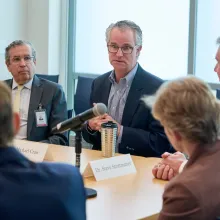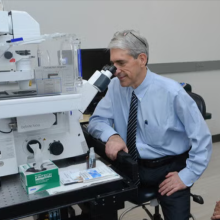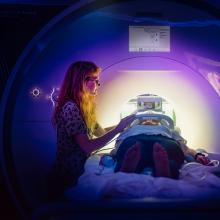Neural circuit development
Most of the complex brain circuitry responsible for our ability to perceive the world with precision actually develops in the womb, before sensory experience is even possible. For instance, visual circuits responsible for our ability to perceive depth and see shapes and colors are already well formed at birth; however, visual deprivation later in life leads to permanent blindness. This implies that intrinsic mechanisms working in the womb, apart from sensory experience, are responsible for wiring the complex brain circuits mediating basic perception. Research in the Crair Lab examines the limits and links between genetic mechanisms and spontaneous or intrinsic neuronal activity in wiring the brain during development. They use a broad array of experimental approaches, from molecular-genetic to sophisticated optical imaging and stimulation techniques in living organisms, to study the properties, role, and mechanisms of spontaneous neuronal activity in guiding neural circuit development. Their research suggests that the remarkable development of complex brain circuitry that occurs in the womb is due, in part, to the generation of complex and patterned spontaneous activity in the peripheral nervous system that then spreads into and through the brain, wiring it along the way.
Methods
Topics
Biography
Michael Crair obtained his PhD in physics from UC Berkeley, then did postdoctoral training at Kyoto University in Japan and UCSF. He was a faculty member at Baylor College of Medicine in Houston, Texas, before joining Yale in 2007. He directed Yale's Vision Core Program, Graduate Program in Neurobiology, and was Deputy Chair of the Department of Neuroscience until 2017, then Deputy Dean for Scientific Affairs at the School of Medicine before becoming Vice Provost for Research in 2020. His partner, Pamela Petersen-Crair, is a Psychiatrist at Yale, and their sons, Benjamin and David, are Yale College undergraduates.





